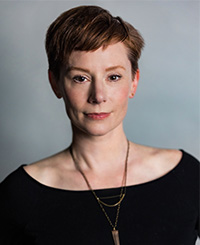PCPA (since 2018): Actor: Maria, The Sound of Music; The Baker’s Wife, Into the Woods; Mrs. Darling/Grown-Up Wendy, Peter Pan; Viola de Lesseps, Shakespeare in Love; Sibella, A Gentleman’s Guide to Love & Murder; Gwendolen, The Importance of Being Earnest ; Portia, Julius Caesar; Director: As You Like It (Marian Theatre), The Cake, The Agitators, The Thanksgiving Play (InterPlay Series), Hamlet; or the Fall of 9 Sparrows (Conservatory)
Other Theatres: The Alley Theatre (Resident Company Member): Roscoe/Rachel, One Man Two Guvnors; Jessica, Hand to God; Elizabeth, The Christians; Utah Shakespeare Festival (Company Member 5 Seasons): Ophelia, Hamlet; Lily, The Secret Garden; Portia, The Merchant of Venice; The Milwaukee Repertory Theatre (over a dozen productions): Marianne, Tartuffe; Mabel, Chaps!; Nellie, world premiere of Jeffery Hatcher’s Armadale; The Folger Theatre: Viola, Twelfth Night; Valeria, The Gaming Table; Baltimore Center Stage, Cincinnati Playhouse in the Park, Shakespeare Theatre D.C., Bay Street Theatre, Hope Summer Repertory Theatre, Yale Repertory Theatre, Yale Cabaret, Pioneer Theatre, The Arden Theatre, Quintessence Theatre Group, Montana Shakespeare in the Parks, The Colonial Theatre – RI Shakespeare in the Park, Next Act Theatre
Off-Broadway: The Lincoln Center Theatre: Sarah Ruhl’s The Oldest Boy (world premiere) and The Chalk Garden (starring Angela Lansbury); The Public Theatre/Shakespeare Society; New Dramatists; E.S.T.; 3Day Hangover/Drunk Shakespeare; The Lark; Titan Theatre Co; WNYC/The Greene Space
Film/TV: Daredevil (Marvel/Netflix); The Perfect Murder (Discovery Channel); Get Married! (Lifetime Television Network); End of a Summer Storm (Alison Krauss/Boynton Music Video); The Violinist (numerous indie film awards); various commercials
Recordings: Simon & Schuster/Folger Library: Juliet, Romeo and Juliet; Ophelia, Hamlet; Portia, Julius Caesar
Other: Contributing scholar to Folger Shakespeare/Luminary Inc.; internationally published poet; script consultant; National Committee for the Bay Area Playwrights Festival
Awards: Wilde Award for Best One Person Show: An Iliad, Queens Time Ledger Best Performance by An Actor: A Midsummer Night’s Dream, New Haven Advocate Best Actress in a Lead Role: Orestes and Best Actress in a Supporting Role: Antibiosis*, Michael and Jan Finlayson Award – Utah Shakespeare Festival, Inaugural Recipient of the Silvia Fine Kay Award for excellence in both Theatre and Musical Theatre – Yale School of Drama
Teaches: Shakespeare I
Training: B.A. Theatre/Literature, Grinnell College; M.F.A., Yale School of Drama
Member: *Actors’ Equity Association, SAG-Aftra
Teaching Philosophy
My philosophy and goal as an educator, as well as a professional theatre artist, can perhaps be best illustrated by considering the slight but significant gap that lies between the words comprehend and apprehend. To comprehend is to “grasp with the mind,” “to perceive” or “understand the nature of” something. To offer and to attain comprehension is certainly a noble pursuit for any teacher-student or actor-audience relationship. But to apprehend is to “take possession of,” “to intuitively understand,” or “to have in one’s custody.” Simply put, apprehending involves grasping something strongly with both hands and hanging on to it. Apprehension is physical, instinctual, intellectual, occasionally frightening, and results in a kind of ownership. It is what I strive to give my students and what I aim for in my own work.
As a professional actress and theatre artist for 15 years, having worked in venues from Broadway houses to site-specific Guerilla Theatre, to film, television, voice-over and commercials, I have apprehended a practical understanding of what it takes to be a working theatre professional. And in my experience, this intangible thing called “talent” that we fixate on so often in our field is revealed, not in the way we perform, but in the way we work. My teaching methodology is guided by the core belief that it is not solely “what you learn” but rather “how you learn.” The primary ingredient of this “how” must be rooted in a dynamic and practiced curiosity.
This cultivated curiosity is particularly necessary and potent when it comes to the exploration of Shakespeare. I believe that Shakespeare is the ultimate workout for the actor – demanding every aspect of a performer: the body, mind, voice, and spirit – the perfect theatrical gym. Simultaneously, it is also the ultimate playground. Once an actor apprehends the core structure of Shakespeare’s writing and the opportunities the rhetorical and rhythmic structure provides, the verse becomes an incredible playground for deep, nuanced, playful and excited explorations and performances.
